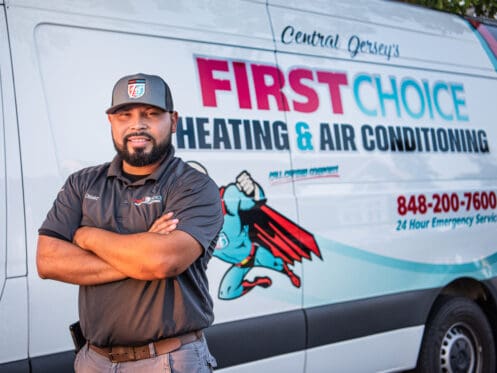Maintaining your Metuchen, NJ home might feel like a full-time job sometimes with the amount of effort it can take. That effort isn’t your only investment, either: Home maintenance costs can be quite pricey. Fortunately, you can limit at least this part of your ownership costs by investing in a home warranty. Home warranties cover the costs of essential replacements and repairs that result from wear-related damage. Some home warranties even cover HVAC systems. However, to get the most from these protections, you need to understand exactly how they work.
Choosing the Right Home Warranty Type
Not every home warranty offers the comprehensive, end-to-end protection that New Jersey homeowners want and need. There are three basic home warranty types. These are home appliance warranties, home system warranties, and warranties that cover both appliances and systems. Although you might think of your heater and air conditioner as appliances, these units are recognized by warranty providers as home systems, and they are only included in warranty plans that offer systems coverage.
Basic, appliance-only warranties cost a lot less than warranties that cover both appliances and home systems, but they only offer coverage for:
- Dishwashers
- Washing machines
- Clothes dryers
- Built-in microwaves
- Garbage disposals
Comparatively, a home system warranty will cover your plumbing system, your electrical system, and your HVAC system. Paying a bit more to get a warranty that covers both systems and appliances will leave you with far less out-of-pocket spending in the long run.
What to Look for When Reading Your Home Service Agreement
Also known as home service agreements, home warranties are binding contracts between New Jersey homeowners and their chosen warranty providers. These documents detail the protections that are supplied by home warranties and the standard claims process. They also describe the various maintenance requirements and other preventative measures that homeowners must take to limit their likelihood of having to file claims.
Keep in mind that home warranties are only meant to cover normal, age-related damage. These agreements will not cover the costs of resolving problems that are the direct result of negligence, oversight, or other shortcomings on the part of consumers. As an example, if your air conditioner overheats and stops working, evidence of a dirty air filter and blocked HVAC air ducts could result in an outright claim denial.
For HVAC systems, maintenance requirements typically include:
- Scheduling annual tune-up service for both heaters and air conditioners
- Having HVAC air ducts cleaned every three to five years
- Reporting problems in a timely fashion and scheduling repairs right away
There may also be stated limitations concerning how your HVAC equipment can be modified throughout the lifespan of your warranty. For instance, adding in-duct air purifiers, air scrubbers, or dehumidification equipment might be considered a breach of contract if the work isn’t performed by a licensed HVAC professional. Integrated accessories like these must be carefully selected and professionally installed to ensure that no undue stress is being placed on furnaces or air conditioners.
HVAC Contractor Selection
Many warranty companies in New Jersey have lists of HVAC contractors that they’ve partnered with. When scheduling inspections, repairs, or replacement services, you may be required to choose from a list of approved providers. If so, you can find the approved provider list for your home service agreement by visiting your warranty provider’s website. You can also call your home warranty company directly for referrals. To avoid having to pay out-of-pocket for services that would otherwise be covered, it’s best to consult with your home warranty company before scheduling work.
Mandatory Waiting Periods and What They Mean
If your HVAC equipment is already on its last leg, you may be tempted to purchase a home warranty right now to avoid having to pay for a system replacement on your own. Some people even attempt to purchase home warranties after one or more of their major home systems have already failed. To protect themselves from consumers who are acting in bad faith, New Jersey home warranty companies have mandatory waiting periods. More often than not, these waiting periods last for 30 days from the date of purchase. Throughout this time, any system repairs or replacements must be paid for out-of-pocket. Additionally, some warranty providers require equipment inspections before the start of coverage.
How to Know If Your Home Warranty Will Cover Your HVAC Issue
Home warranties can only be used to cover the costs of age-related wear. HVAC equipment problems that are the result of defective materials or substandard manufacturing may be covered by your HVAC manufacturer’s warranty instead. Likewise, your home insurance policy will pay for HVAC damages that are the result of floods, fire, or other covered perils.
Tips for Maintaining Compliance With Your New Jersey Home Warranty
Having a comprehensive home warranty makes dealing with age-related HVAC problems a lot easier. However, remaining compliant with the terms of this agreement can be a challenge. In addition to reading through your home warranty in its entirety, it’s also a good idea to purchase a preventative maintenance plan. HVAC preventative maintenance plans are designed to provide all of the maintenance services that heating and cooling equipment requires. They also keep homeowners on par with the terms of their home service agreements, manufacturer warranties, and home insurance policies. Some insurance plans and home service agreements pay for annual maintenance service as a standard or enhanced benefit.
What Happens if Your HVAC System Needs to Be Replaced?
Every element within your HVAC system has a finite lifespan. Your air conditioner and heater should be replaced about every 15 to 20 years. Your HVAC air ducts require replacement every 10 to 15 years. Most warranties that cover HVAC systems will pay to replace heating and cooling equipment that has reached the end of its lifespan, but not all home warranties cover HVAC ducting. When reading through your home service agreement, check to see which provisions will be made for age-related air duct problems.
There are usually strict limitations on how much warranty issuers will pay for HVAC replacement. For instance, if your request for air conditioner replacement is approved, your warranty provider will pay for a unit that’s comparable in cost to your old one. If you want a more efficient or feature-rich model that’s offered at a higher price, you will likely have to pay the difference. Moreover, if non-age-related renovations must be made to your HVAC air ducts to accommodate the installation of your new air conditioner, the cost of this work will likely be an out-of-pocket expense as well.
Submitting a request for total replacement can sometimes be more time-consuming and labor-intensive than requesting a simple, low-cost repair. You may be asked to provide proof of your air conditioner’s age and maintenance history, and you might need to have your chosen HVAC technician document why replacement is the most cost-effective choice. Warranty companies that issue denials for replacement requests often do so with written justifications of why. In most cases, unless warranty holders have failed to comply with basic maintenance requirements, a replacement denial is followed by an approval for repairs.
We proudly serve homeowners in Metuchen, NJ and the surrounding area. We offer heating, cooling, plumbing, and indoor air quality services. We also provide preventative maintenance plans and oil-to-gas conversions. If your HVAC equipment is experiencing age-related issues, we can help. Give First Choice Plumbing, Heating & Air Conditioning a call today to schedule an appointment.




